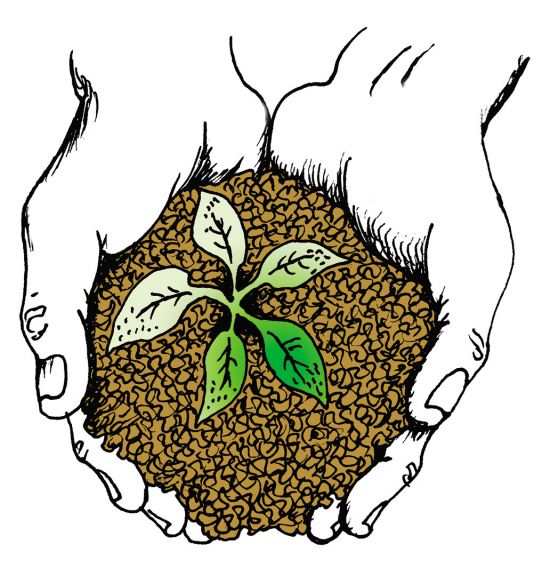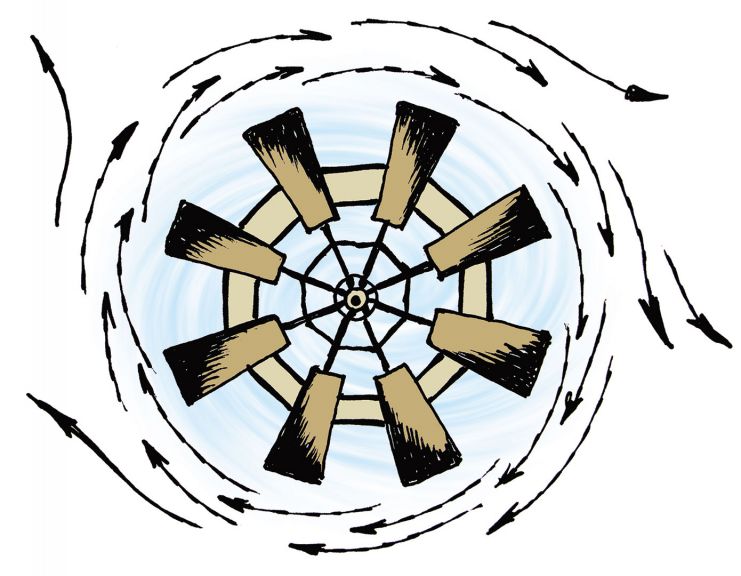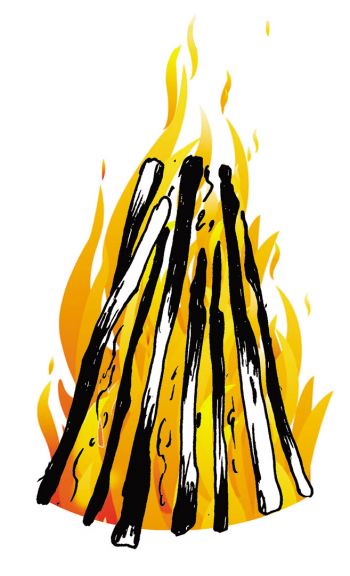Earth
The last of the Right Tuesdays is Earth Tuesday, mostly celebrated as the Last Tuesday or the End-of-year Tuesday in the various regions of Azerbaijan. The process of waking up, revival and coming to life that started a month before is thought to culminate on Earth Tuesday.
The Last Tuesday differs from others in its importance and grandeur. This Tuesday is not just a holiday, but also Azerbaijanis’ favourite and most sacred day of the year, when they demonstrate the best of their characteristics - benevolence, hospitality, humanity and others. On this Tuesday fires are made like on all the others and the Tuesday khoncha is prepared. Ceremonies, games and entertainment are performed to ease and cleanse and provide the psychological and aesthetic foundation for a new spirit in the new year.
All family members, regardless of where they live and the distance between them gather at the family home and celebrate the holiday together. As a sign of this unity and solidarity, in every house candles should be lit for every family member. Everyone chooses a candle and makes a wish and whoever’s candle burns longest will have their wish come true.
The Last Tuesday feast is also very rich. In some regions of Azerbaijan it is called Loyun, Lavin, Yeddiloyun, Yeddilavin and sometimes Yeddisin (meaning “Types” and “Seven types” respectively). The names are significant – people believe there should be seven boons (goods) on the Last Tuesday table and their names should all begin with the letter “S” in Azerbaijani: for example, water (su), wheat shoots (samani), ears of wheat (sunbul), sumac (sumag), onion (sogan), garlic (sarimsag) and sulag.
On the night of the Last Tuesday sacks of wheat and flour and other food containers are left open. According to tradition, goods are distributed during the night and if the sacks are closed then people may not receive their share. Families make fires and add rue (uzarlik) and thorn bushes to the wood to ward off evil forces - guardians and protectors of winter, the cold and frost that will try to extinguish the fire and prevent the revival of nature.
Jumping over fire is a feature of this Tuesday too, only it isn’t just performed by people but by cattle and sheep as well, in order to rid them of hardship from the old year. The abundant feast is also purified on the fire and marriageable girls perceive the Last Tuesday fire as a magical force granting good fortune, which is reflected in the song they sing when jumping over it:
Let my difficulties go away,
Let them burn in the fire,
Let the fire burn,
Let my good fortune awaken.
The ash from the Last Tuesday fire is sprinkled over the four corners of the house to attract abundance and drive away evil spirits.

Wind
The third Tuesday is called Wind Tuesday, Windy Tuesday or Breezy Tuesday. On this Tuesday the soil and earth were believed to warm up and flowers to raise their heads. The cold and warm winds blowing on Wind Tuesday signal the coming spring; the slumbering wind has woken up, starts blowing and stirs water and fire. The changing nature of the wind during the day is perceived as the wind cleansing itself.
People also refer to Wind Tuesday as Fathers’ Tuesday, Ancestors’ Tuesday or Black Tuesday. During this evening everyone, including those living in other cities and regions, return to their home village or town to visit the graves of their relatives and loved ones. There they say prayers for them and place flaming torches on their graves. A traditional khoncha (a large tray of sweets such as gogal, shakarbura and baklava, as well as nuts, eggs and candles) is also prepared and placed on the graves.

Fire
The second Tuesday is Fire Tuesday. It is known in the various regions of Azerbaijan as Mujdaveran, Mujdachi or Mushtuluglu (Herald), Kule or Kul (Ash) and Xəbərçi (Messenger). On this day people begin to feel the breath of spring, the warmer weather and start to think about the garden and planting. Ash is taken from fires made that evening and sprinkled in the garden while it is still hot, over areas to be used for planting, to wake them up. In so doing people create a symbol of warmth and express their wish for the soil to emerge from hibernation.
People believe that the sun (or fire) is a symbol of life, creation, wealth, power, strength, light and glory. Fire is also thought to heal illnesses, drive away evil forces and ease hardship, which meant people used to perceive it as a gift from God and worshipped it. According to some, on the territory of Azerbaijan in the distant past the holidays of Sadda and Azarkan in honour of the sun (fire) were celebrated 50 days before Novruz with celebrations of the fires burning in temples and hearths. In those times it was traditional to make sacrifices to the sun early on the morning of Fire Tuesday. Some say that the sacrifices were brown horses, believing that this brought happiness and good fortune.
Phrases like “I swear by fire,” “I swear by the sun,” “I swear by the light” and “may your hearth never go out” are still used by Azerbaijanis today.

Earth
The last of the Right Tuesdays is Earth Tuesday, mostly celebrated as the Last Tuesday or the End-of-year Tuesday in the various regions of Azerbaijan. The process of waking up, revival and coming to life that started a month before is thought to culminate on Earth Tuesday.
The Last Tuesday differs from others in its importance and grandeur. This Tuesday is not just a holiday, but also Azerbaijanis’ favourite and most sacred day of the year, when they demonstrate the best of their characteristics - benevolence, hospitality, humanity and others. On this Tuesday fires are made like on all the others and the Tuesday khoncha is prepared. Ceremonies, games and entertainment are performed to ease and cleanse and provide the psychological and aesthetic foundation for a new spirit in the new year.
All family members, regardless of where they live and the distance between them gather at the family home and celebrate the holiday together. As a sign of this unity and solidarity, in every house candles should be lit for every family member. Everyone chooses a candle and makes a wish and whoever’s candle burns longest will have their wish come true.
The Last Tuesday feast is also very rich. In some regions of Azerbaijan it is called Loyun, Lavin, Yeddiloyun, Yeddilavin and sometimes Yeddisin (meaning “Types” and “Seven types” respectively). The names are significant – people believe there should be seven boons (goods) on the Last Tuesday table and their names should all begin with the letter “S” in Azerbaijani: for example, water (su), wheat shoots (samani), ears of wheat (sunbul), sumac (sumag), onion (sogan), garlic (sarimsag) and sulag.
On the night of the Last Tuesday sacks of wheat and flour and other food containers are left open. According to tradition, goods are distributed during the night and if the sacks are closed then people may not receive their share. Families make fires and add rue (uzarlik) and thorn bushes to the wood to ward off evil forces - guardians and protectors of winter, the cold and frost that will try to extinguish the fire and prevent the revival of nature.
Jumping over fire is a feature of this Tuesday too, only it isn’t just performed by people but by cattle and sheep as well, in order to rid them of hardship from the old year. The abundant feast is also purified on the fire and marriageable girls perceive the Last Tuesday fire as a magical force granting good fortune, which is reflected in the song they sing when jumping over it:
Let my difficulties go away,
Let them burn in the fire,
Let the fire burn,
Let my good fortune awaken.
The ash from the Last Tuesday fire is sprinkled over the four corners of the house to attract abundance and drive away evil spirits.
- Posted by Aida Alakbarova, 29.03.2018

Games and rituals
The Last Tuesday also involves a broad range of games, performances and rituals. The “ear divination” game has a deep educational, moral and psychological meaning. People, particularly young girls, take a cup of water, a mirror and a key, make a wish and approach their neighbours’ doors to discover if their wish will come true in the next year or not. They put their ear to the door, secretly listen in to conversations inside the house and interpret the first word they hear in relation to their wish. If there is a correlation between the words they hear and their wish, it means the wish will come true. As a result, on the Last Tuesday people try to talk positively in their homes, so that those listening in won’t get upset. The water encourages safe passage, the mirror - bright life and the key - that wishes will come true.
In Papaqatdı, young people knock at the door, throw their hats down and hide. The homeowner finds the hat, fills it with Tuesday gifts and places it back outside the door for its owner to come and collect it.
Marriageable girls carry out another ritual to test their fortune: they stand in front of their houses with their backs to the yard and throw their right shoes with their right hands back over the right shoulder. In the morning they look to see the position of the shoe on the ground; it is believed that if the toe is pointing towards the road and the heel towards the house the owner will soon receive good news, for example that they will get married.
One of the most interesting rituals is Danatma, mainly performed by young girls and boys, who gather in separate homes and have fun throughout the night with interesting conversations, stories and jokes and singing songs. But they mustn’t fall asleep. If someone falls asleep, their clothes will be sewn to the carpet as punishment for all the singing, chatting and dancing and their wishes won’t come true. By contrast, the first person to see the first signs of morning will have success in the new year.
During the game Xanbazama (“adorning the khan”) people gather in squares, dress the person chosen to play the khan and seat him on a throne. Two boys wave fans at him and a chosen vizier and advocate stand to his left and right. Appointed servants and an executioner dressed in red stand ready for the khan’s orders. The khan gives unusual orders which must then be carried out unconditionally. Kosa, the bald fool, tries to make the khan laugh through a series of funny acts. If the khan laughs, he is removed from the throne, thrown into water and a new khan is chosen. The performance lasts for hours.
Young people and children also enjoy games such as dasmalatdi (throwing kerchief), shalsallama (shaking the shawl), gurshagatdi (throwing the belt) and gurshagsallama (shaking the belt). Kosa-Kosa, Chovgan (polo), Fincan-Fincan (cups), Gashig oyunu (game with spoons) and clashing eggs.
About the author: Tahir Shahbazov works at the Institute of Archaeology and Ethnography of the Azerbaijan National Academy of Science and has written many articles on the ethnology of Azerbaijan


Комментариев нет:
Отправить комментарий